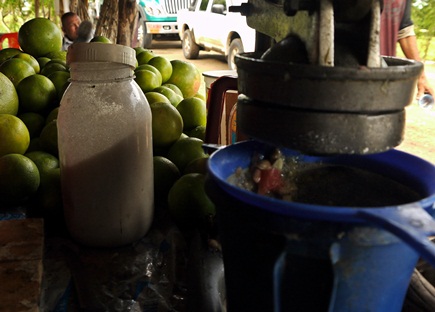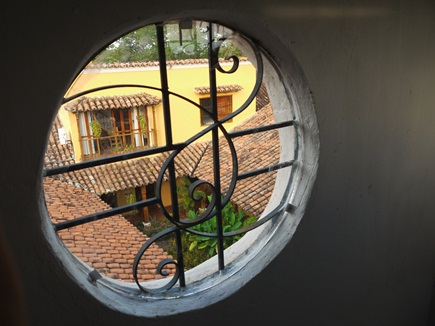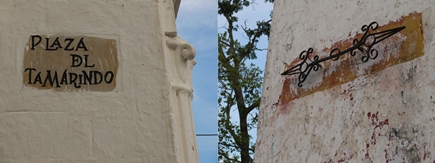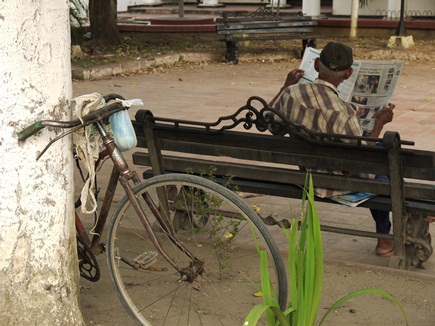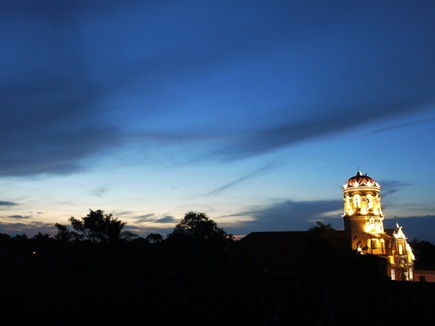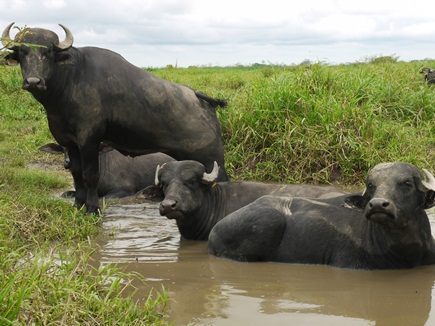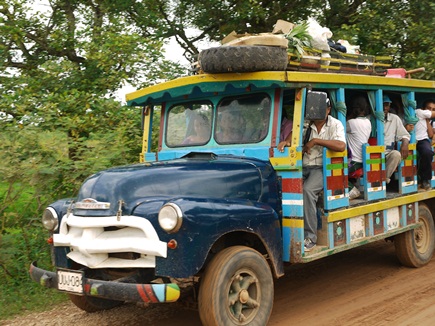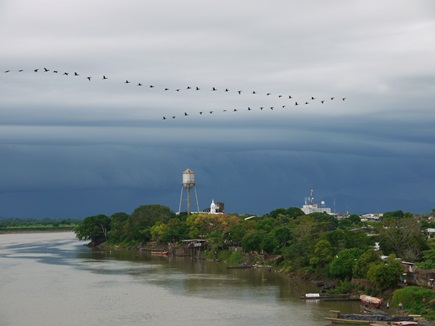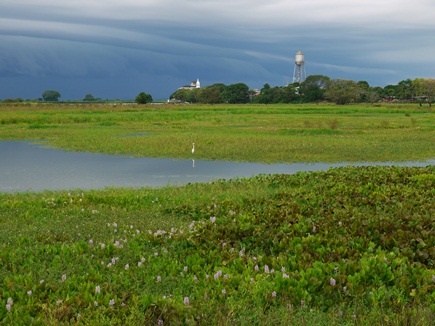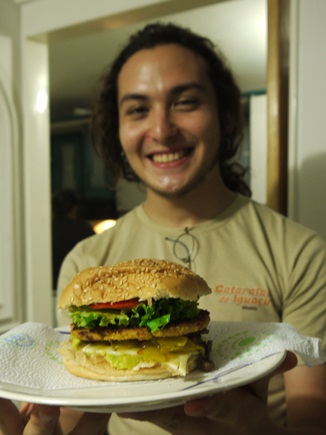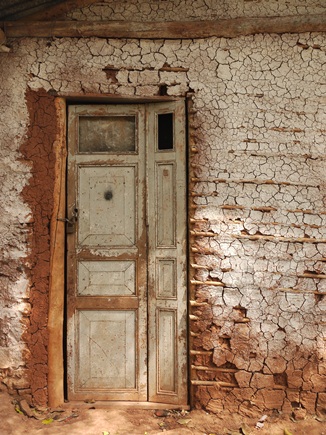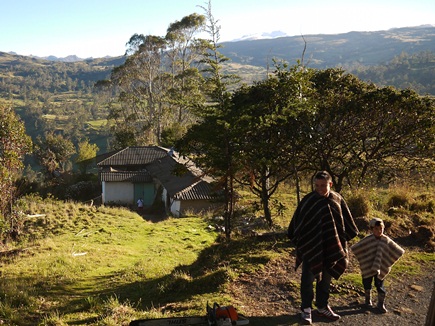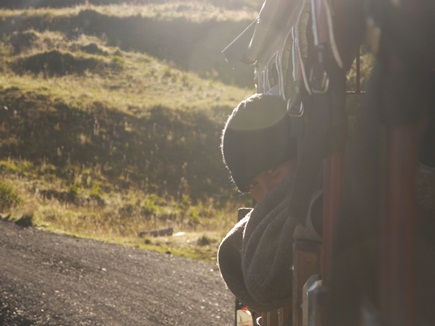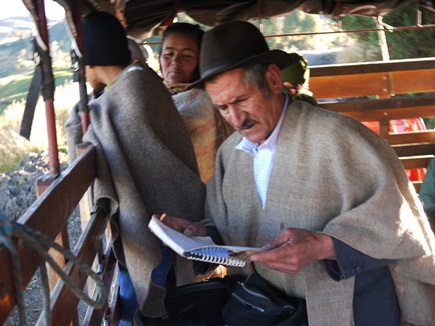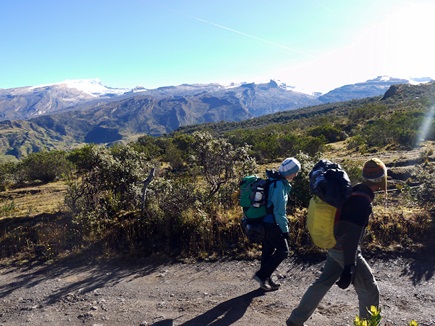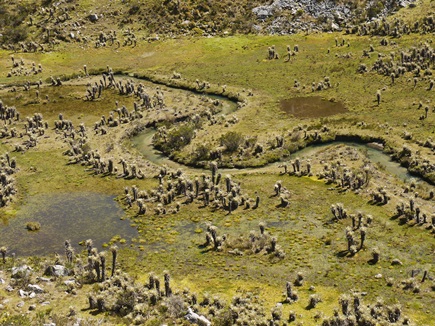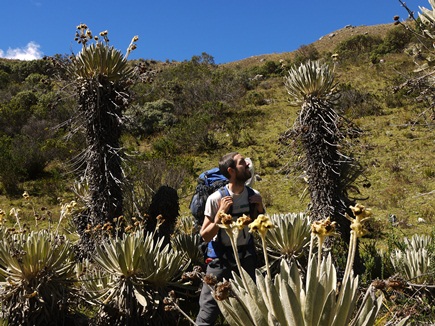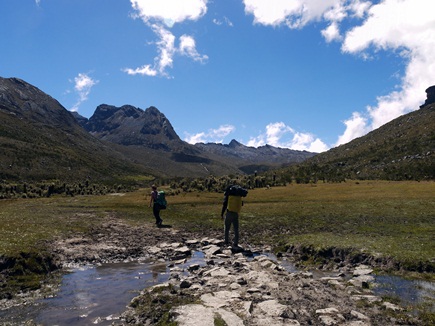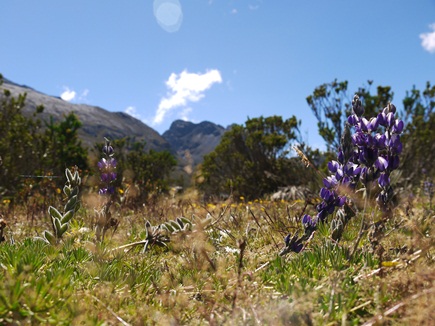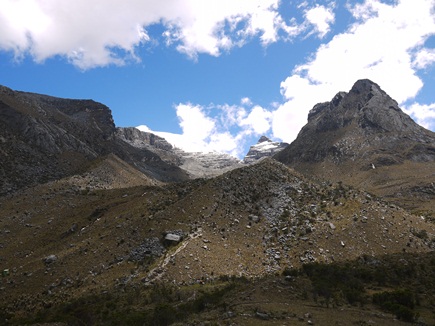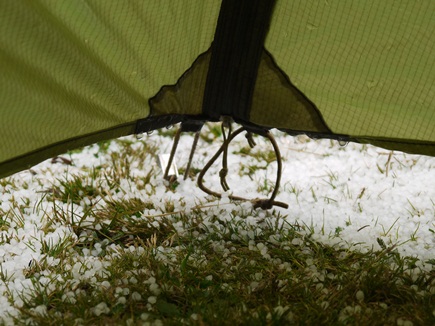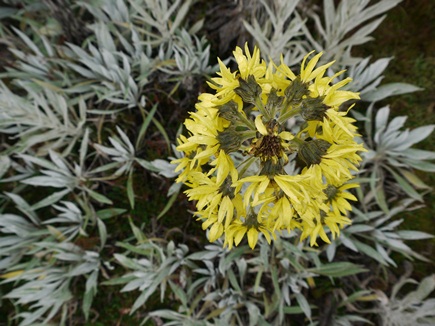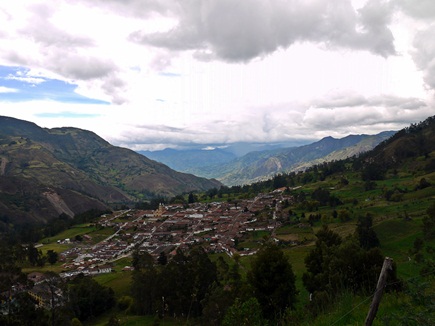Cartagena to Bucaramanga – via the swamps
October 1st, 2012
For a supposed cycling trip, sometimes we seem to be very good at avoiding our bikes. With Ed’s visit and then some serious bike faffing and mechanical manoeuvring in Cartagena (my hub finally returned and was fitted), suddenly it was mid September and another month had passed by without our feet touching the pedals. We’d definitely found a limit to our personal comfort boundaries in Cartagena. A pleasant enough city, it’s stiflingly hot and I was more than ready to hit the road.
Colombia’s mountains lay ahead, waiting for us with famously tough cycling along switchback roads at high altitude but before we reached them we had a warm up (literally) of a couple of weeks cycling away from Cartagena and into the hot and steamy swamps…
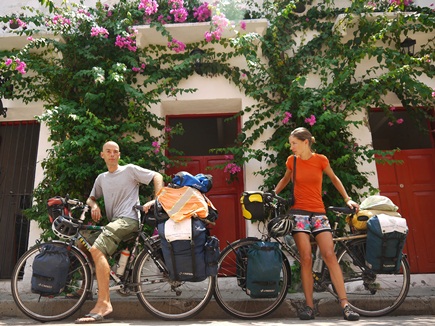
During our last few days in Cartagena we met Raul and Marta, fellow cyclists from Spain and Poland, who are doing the same north-south route as us. It was great to share food, experiences and ideas – we hope to meet them again somewhere along the road in South America…
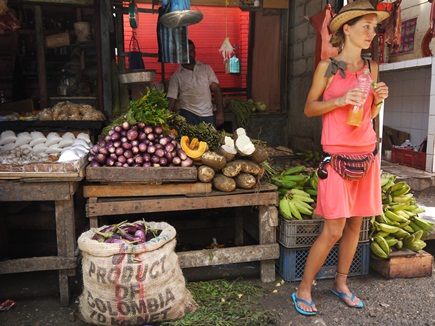
A trip to the market in Cartagena with Raul and Marta before we all left was an education. They're far better acquainted with the delicious but baffling tropical fruits of Colombia and they introduced us to some new sweet treats such as granadilla and pitahaya.
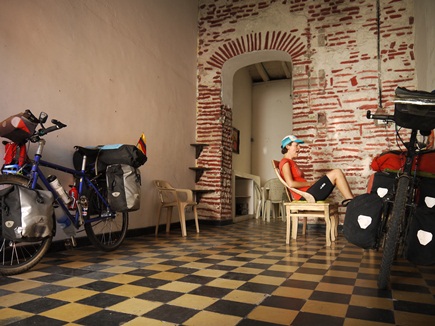
…then it was time for us to leave too. Our home for ten days had been in a beautiful old colonial house with five Colombian university students. Initially they thought we were very odd; even more so when the lycra came out.
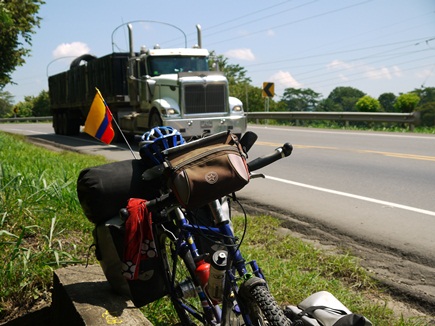
The first 150km out of Cartagena, along a very busy flat road, couldn't be counted as a highlight of our trip…
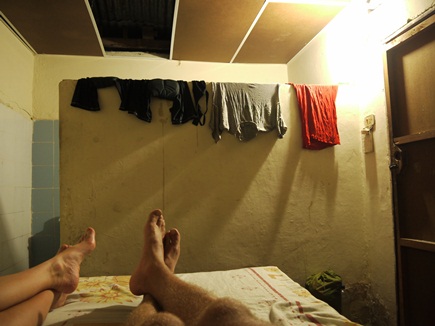
…especially when we found oursevles staying in shabby roadside hotels instead of camping as we had hoped. The rooms were cheap enough but often not dissimilar to a concrete cattle stall, and definitely inferior to spending the night in our tent.
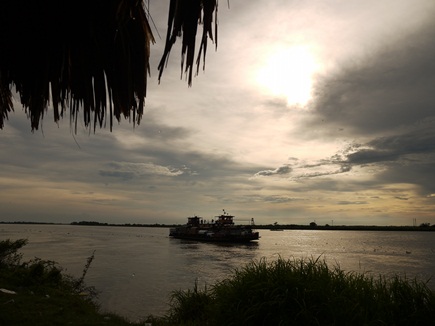
Happily, we reached the end of the busy road and the pace slowed considerably. The only sensible way to reach Mompos is by a slow river ferry across the Río Magdalena, the largest river in Colombia.
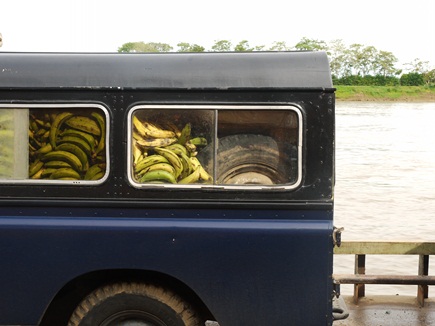
…and then hungrily eyed up this jeep filled with plantains. Fried and squashed and then fried again, plantains become patacones, a starchy, filling staple which appeals to the ravenous cyclist.
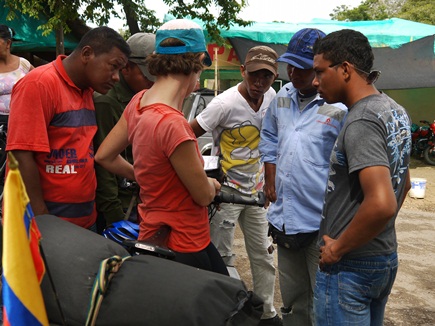
Our arrival on the other side of the river in La Bodega caught the attention of some local taxi drivers who insisted on knowing where we were going….
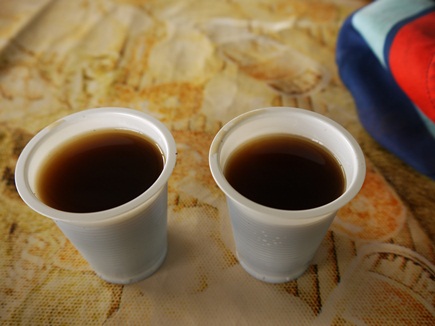
…and so we stopped for a big breakfast, a chat and the obligatory café tinto. Served from a thermos flask with added sugar, tinto comes in small shots and never costs more than about 15 US cents. It's pleasing to see that Colombians drink their own coffee (some of the best in the world) instead of sending it all for export like may of the Central American countries we've passed through.
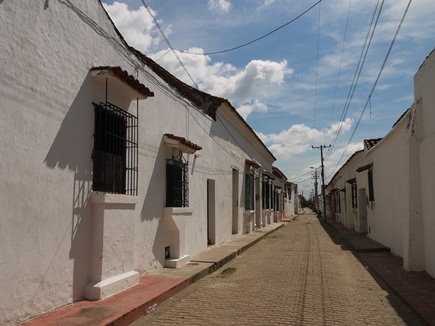
After breakfast, a short ride through the wetlands and we were in Mompos, a sleepy town that's stuck in a colonial time warp. Sun baked streets…
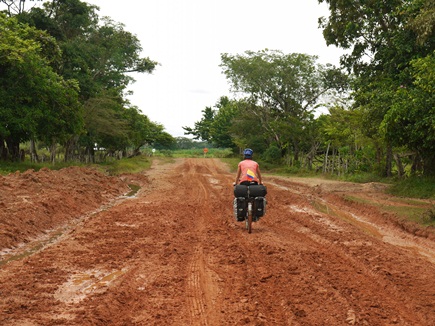
After a blissfully relaxed rest day in Mompos and a big thunderstorm we set off toward El Banco through lots and lots of sticky red mud.
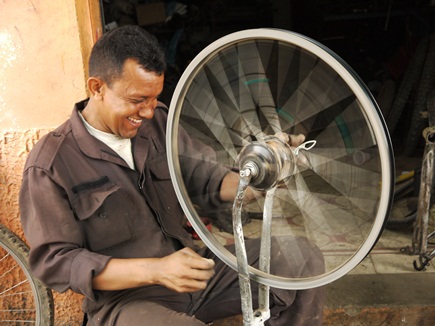
We made it through the mud but suffered another snapped spoke for James – the third in three days. The grin on expert mechanic Eliseo's face as he trues the wheel is a stark contrast to the disgruntled frown that James wears when he tries the same repair out on the road.
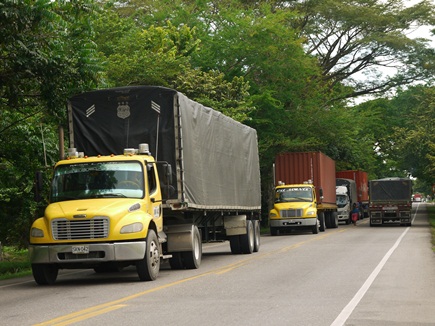
All too soon we were back on the main road. Heaving with trucks on just two lanes, this was some of the scariest riding we had done on the entire trip and renewed our commitment to finding quiet back roads and dirt tracks whenever we can.
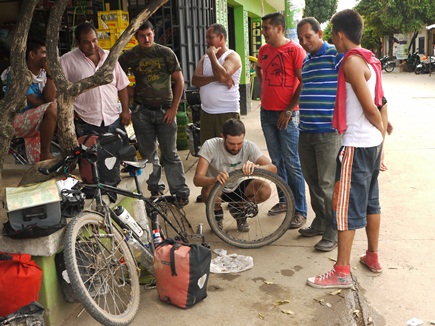
Another interested group in another town. This time it's watching James change as puncture that draws a crowd; at times there were up to fifteen men looking on!
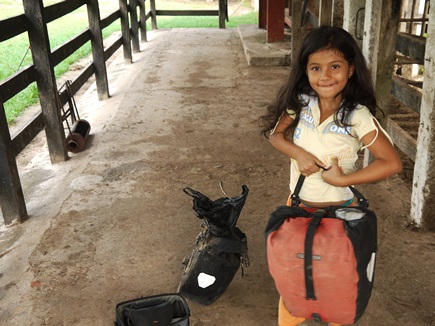
After a long afternoon on the busy road we looked around for a place to stay and wanting to avoid another shabby hotel, we opted to ask at a finca. And so instead of a cow stall style room, we actually did stay in a cow stall. Joanna, daughter of one of the farm workers, was keen to learn some English words and help us with our packing.
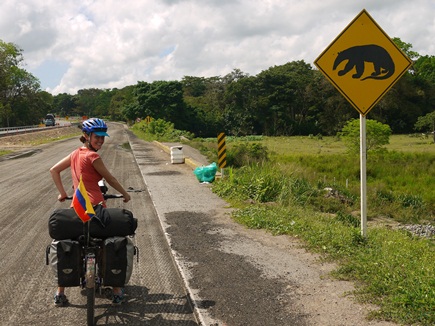
Back on the busy road for the day and we were relieved to find some stretches of new carriageway not yet open to traffic but perfect for cycling…sadly we didn't spot any ant eaters along the way.
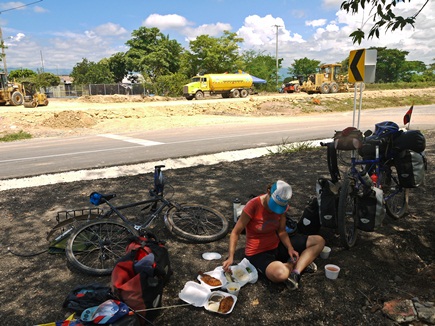
Another snapped spoke and then two punctures left us stuck in a lay-by for the best part of two hours. This long stretch of road is full of construction crews and we happened to stop next to one and swear and sigh with frustration at James' mechanical problems. They looked on amused and then took pity, gifting us two leftover lunches. As always with free food, the stress fizzled away and we gratefully tucked into fish, soup and rice.
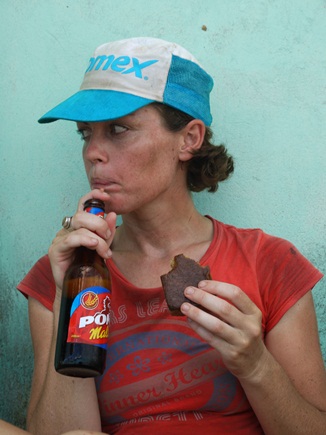
The incredibly kind construction crew sent us on our way with even more goodies. On the afternoon dash to San Alberto, feeling tired, sweaty and filthy, their gift of banana cake and apples, along with a cold bottle of Malta, made the nasty road seem a bit more palatable.
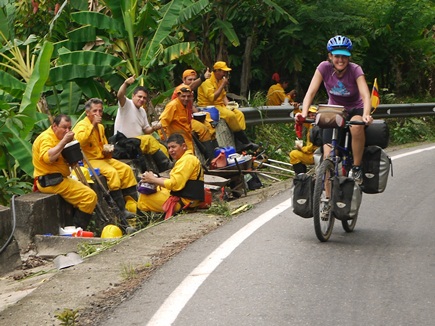
Thankful for less traffic the following day, we got stuck into the first proper climbing we had done for months; passing more friendly workers along the way…
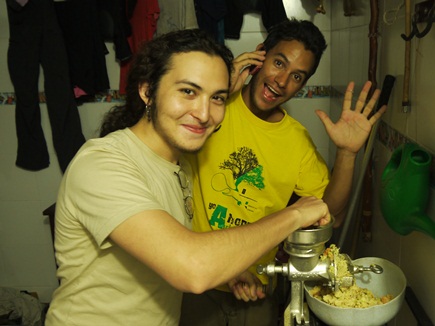
…and we arrived in Floridablanca near Bucaramanga to the most hospitable of Colombian welcomes from Julian (right) and his family and friends. He and his friend, also called Julian, spent hours in the kitchen making delicious veggie burgers…
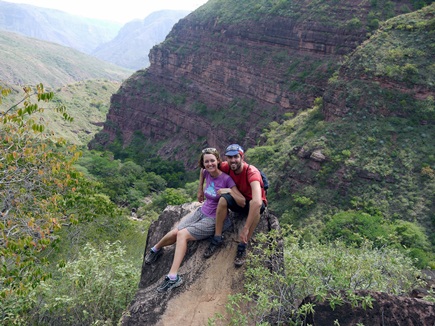
Julian convinced us to take an extra day off and took us out into the countryside to see the Cañon de las Iguanas, a place we could never have accessed by bike.
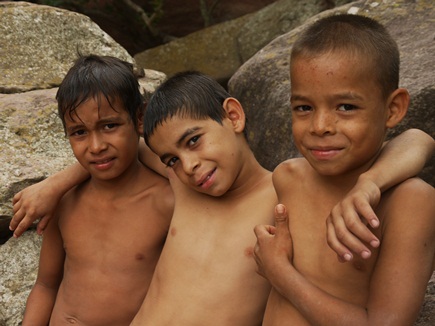
These three brothers acted as our guides down into the canyon and then spent the afternoon lazing, swimming and chatting with us….
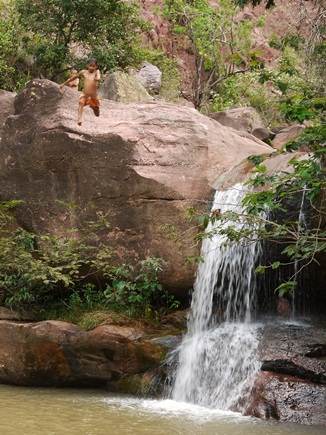
….and taking the risky jump into the water in the afternoon sun that the three of us didn't feel energetic enough to try.
Sarah
Into the foothills: an Andean warm-up
October 6th, 2012

Our Andean “warm-up” ride: start at 850m, drop to 300m. Climb up to 1800m, before descending again to 500m. Then a final climb up to 1600m, followed by a final descent to 1100m. If I'd have been wearing a heart rate monitor, the print out might have looked similar…
“It is by riding a bicycle that you learn the contours of a country best, since you have to sweat up the hills and coast down them.”
Ernest Hemingway
I’m not sure if Hemingway ever dragged himself away from his Cuban daiquirís long enough to explore Colombia by bike – but if he had, he may have found his theory tested to its limits.
For southbound cyclists like us, Colombia is where the foothills of the Andes begin. From here down through Ecuador, Peru, Bolivia, Chile and Argentina, chances are we are either going to be crawling uphill very slowly, or bumping downhill slightly faster – and not much else in between. As they say around here with a mischievous wink of understatement, it’s about to get very columpio (“lumpy”).
Second only to the prospect of saddle soreness, climbing is perhaps the one aspect of cycling that sends non-cyclists’ eyebrows upwards, and their hands reaching for their car keys. It is definitely cycling at its most masochistic – an orgy of sweat, burning lactic acid and hyperventilation…all for what? Just to say that you’ve conquered a hill? And then, chances are, to freewheel all the way back down again to where you started. Surely it doesn’t get much more pointless than that.
Yet for me climbing is also cycling at its rawest and most addictive. It’s escapism in its purest, most physical form. Hit a serious climb and for that moment, it’s just you versus the hill: second by second, pedal stroke by pedal stroke, hairpin by hairpin. Add in 50kg of heavy steel touring bike, a tent, stove, fuel, food, water, clothes and assorted clutter, and the equation definitely tips in favour of the hill. The romanticism quickly evaporates – but somehow the addiction remains.
It will be interesting to see just how quickly the Andes cure my addiction and beat any remaining drops of romanticism out of me. I have a feeling that it might not be too long before I’m daydreaming about those sweaty days on the flat coastal plains of Central America…
And so, with the mountains looming ahead, we decided the only option was to get stuck straight in. After dragging ourselves away from the warmth and hospitality of Julian’s wonderful family in Bucaramanga, we headed out for a serious warm up in Colombia’s Cordillera Oriental.
I remembered reading about a back route that Cass Gilbert (as ever our PanAm dirt road guru – thank you Cass!) had taken from Bucaramanga to San Gil on his own journey through Santander over a year ago. Having spent much of the last few days from Mompos truck-dodging on main roads, we decided to give it a try.
Add in a healthy dose of Colombian hospitality, and it turned into one of my favourite dirt road rides of the trip so far. The climbs were definitely tough, but as always the rewards of riding in the mountains made all the effort worthwhile: stunning landscapes, beautiful pueblos and generous people.
James
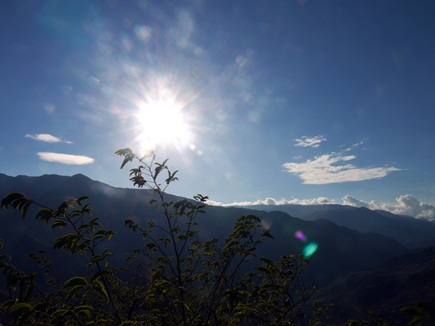
A gentle day's ride out through Giron led us past the Cañon de las Iguanas that we had visited with Julian the day before, and to the foot of the first 1500m climb up towards Zapatoca. The next morning we set off, putting into practice the seven steps to hill climbing glory we have learned over the past 15 months…
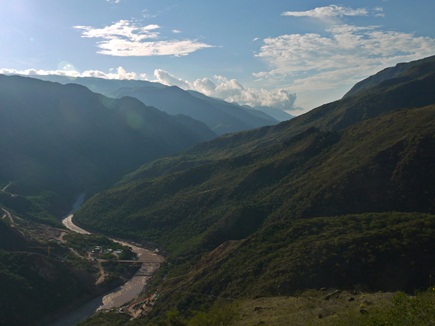
1. Rest. Make sure you get a good night's sleep. Like a pair of trolls, we camped under the bridge at the base of the climb. It turned out that we were in the middle of a massive construction site for a new hydroelectric dam project – but needless to say we still slept like logs. It takes more than a few industrial drills to keep us awake these days.
2. Rhythm. Hit play on Hot Chip’s new album – current hill climbing soundtrack of choice.
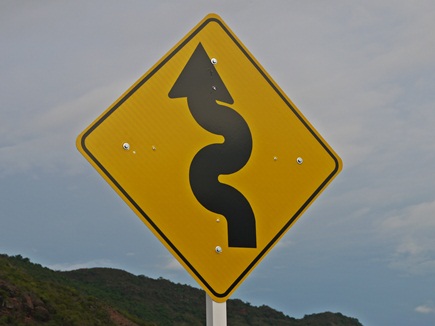
3. Navigation. Make sure you're going the right way, ie up. Follow this sign and you can't go wrong. In universal cycling language it generally translates as “sweat, swearing and pain ahead”.
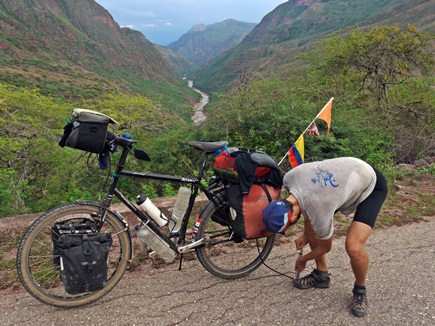
4. Pressure. After five minutes climbing, convince yourself that your tyre pressure must be low – and that's why it feels like you're trying to cycle through treacle. Tyre pressures are fine. Add some more air anyway. It still feels like cycling through treacle.
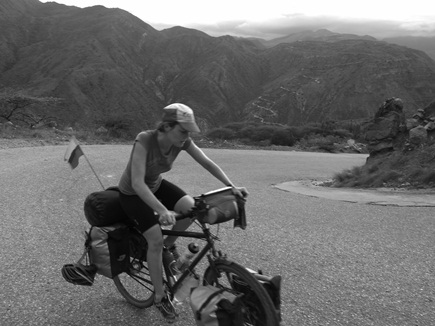
5. Breathing. We've found this definitely helps. Drop bottom jaw as much as possible and add in a thousand yard stare for good measure.
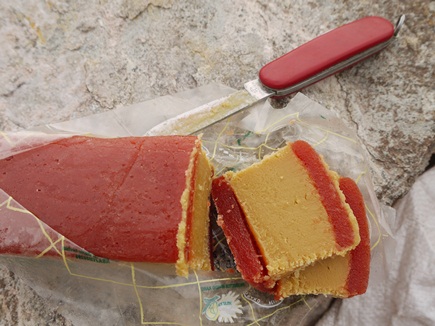
6. Nutrition. Ideally as much sugar as possible – in this case a brick of bocadillo courtesy of Julian's mum Edu in Bucaramanga. Think Kendal mint cake a la colombiana: a slab of arequipe (caramel) sandwiched between two layers of mermelada de guayaba (guava jam). Guaranteed sugar high for at least ten minutes.
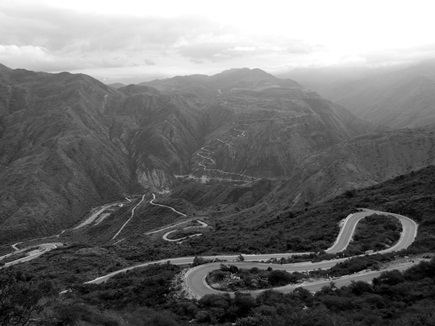
7. Smugness. Not recommended until you reach the top – but then don't forget to look back and bask in the sweat and glory of your spaghetti-like route up the mountain.
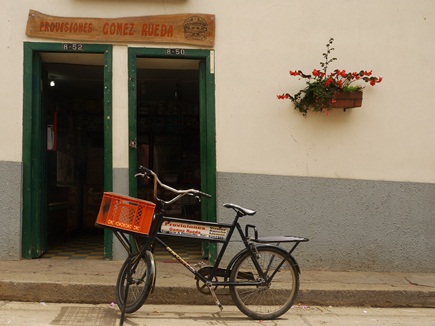
And so after a morning of climbing, we arrived in Zapatoca – a magically laid-back santandereño mountain town where groceries are delivered by cargo bike…
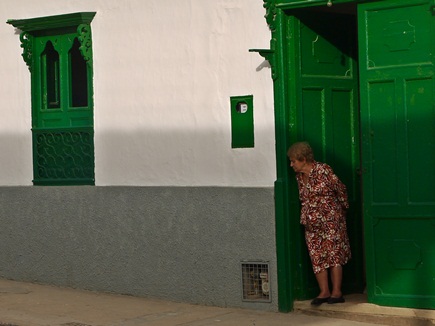
…and ladies peer from colour-co-ordinated doorways. About to drag ourselves back onto the road, we met Eduardo. A reporter for the local community TV channel, he asked if he could interview us about our trip. Of course, we said – always open to distraction and thinking it would be funny. It was indeed funny (you can watch it here if you're really bored and happen to speak pigeon Spanish), and we thought that was it. However, it seems not much happens in Zapatoca, and so Eduardo had plans for us…
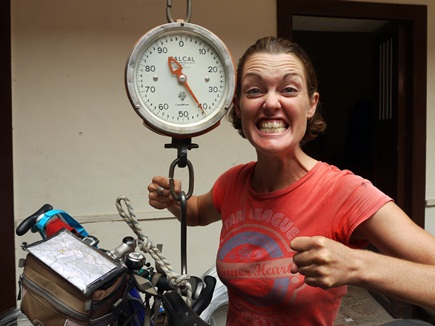
First up, he insisted on a visit to the local ferretería (ironmongers) for a bike weigh-in. Mine tipped the scales at 46kg, and Sarah's 41kg – slightly disturbing considering we both currently only weigh about 60kg ourselves, and that we had run our water and food rations down to nothing in preparation for all the climbing.
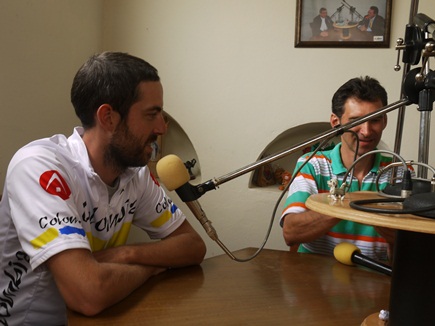
Then, before we knew it we were in the studio of the local radio station Radio Lenguerke – it turned out Eduardo had his own afternoon show and we were just in time for a live interview – cue plenty more cringeworthy moments.
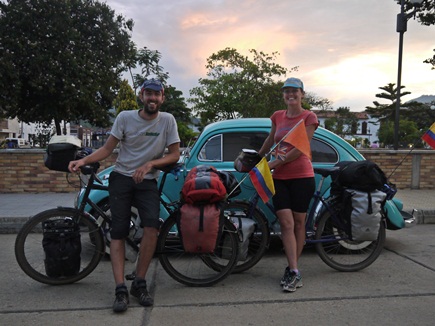
By this point it was clear that we weren't going to leave Zapatoca that day. No problem, said Eduardo – I have a finca and you can sleep there. So time for a last quick snap in the town square…
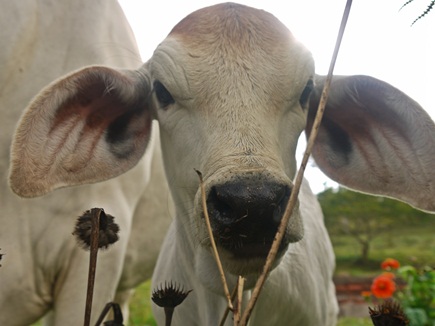
…before heading up to the finca to meet our by now familar cast of rural neighbours – from the curious…
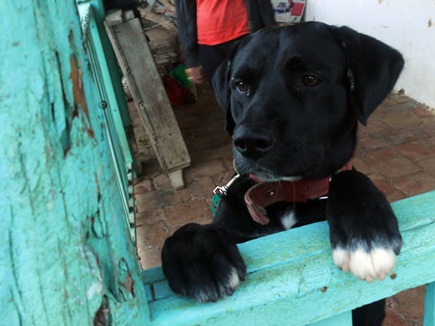
…to the downright soppy. Eduardo and his wife fed us hot chocolate, sweet bread and cheese – and for the first time since Guatemala we dug our sleeping bags from the bottom of our panniers, and slept in delicious mountain coolness.
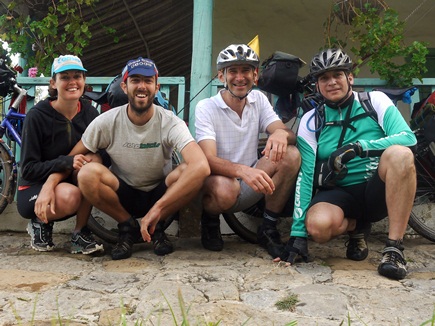
A keen cyclist himself, Eduardo couldn't resist the opportunity to tag along for the ride the next day. And so, having found a stand-in for his radio show and recruited his friend Manuel for the ride, the next morning our new team of four set off from the finca.
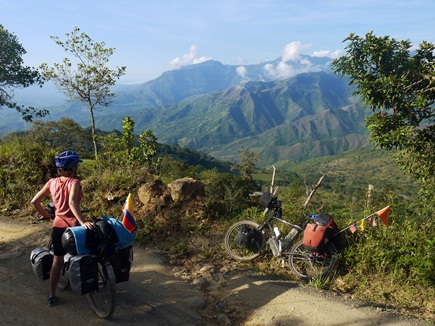
From Zapatoca we wound our way along the ridge…
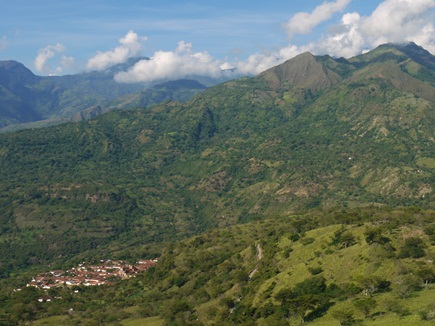
…before diving down through the switchbacks to the small village of La Fuente in the valley below.
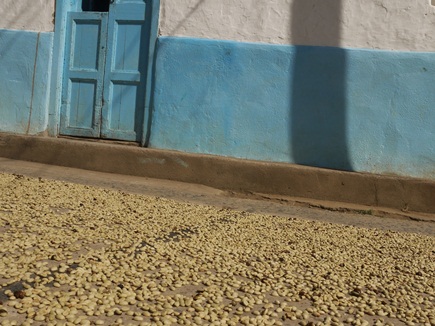
La Fuente was another immaculate, laid back pueblo santandereño, where coffee was laid out to dry in the streets…
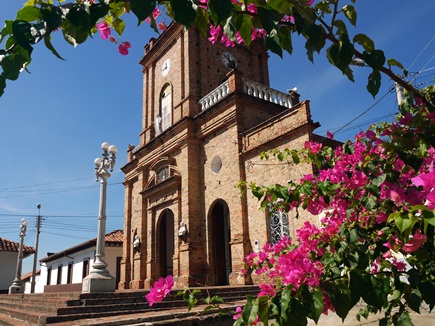
…and the school PE lesson was in full flow in the main square in front of the church.
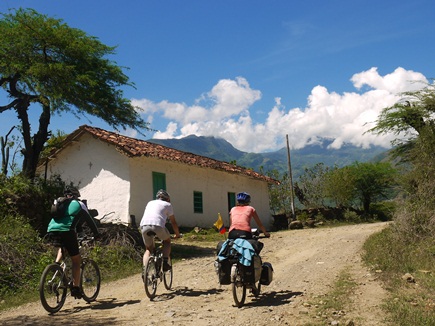
From La Fuente the climbing began again, up towards the village of Galán. A quick stop for the obligatory mid-morning malta, and then it was a rocky downhill…
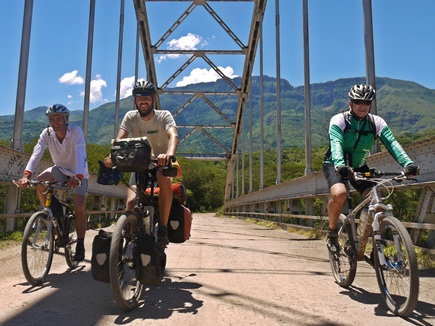
…all the way to the Puente Eduardo Santos over the Río Suarez – the very same river we had started from the morning before, just a little further along the same valley. Good to know we were making progress then…
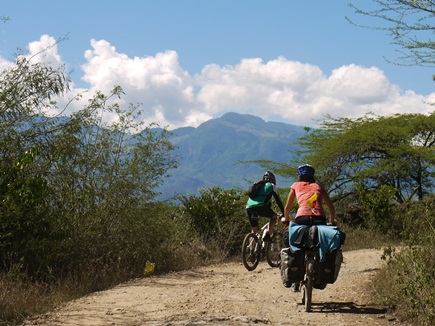
By now the midday heat was really starting to take its toll. We crawled slowly up the final climb of the day and into the village of Guane.
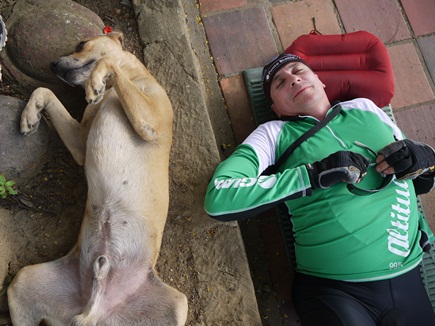
After a well-earned hearty plate of comida corriente (no-one mixes their carbs like the Colombians – rice, pasta, yucca and plantain on a single plate is common), we retired to the square in a carb-induced coma…

…interrupted only by Eduardo calling back into Radio Lenguerke for an update on the day's progress. The boys were headed back towards Zapatoca the same day, and so we bid a sad farewell to our new friends. ¡Gracias hermanos, esperamos la próxima vuelta con mucha anticipación!
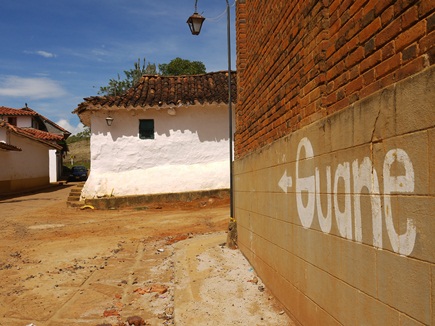
The next morning, after a night camped on a nearby finca, we headed up the final leg of the climb into Barichara – touted as the most beautiful village in Colombia and the setting for many telenovelas (soap operas) and films.
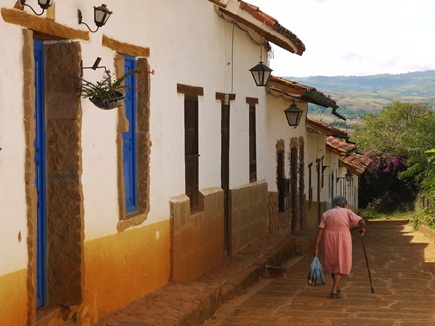
It certainly ticks all the boxes for a picture postcard colonial village: old ladies wandering down paved sidestreets with mountain backdrops…
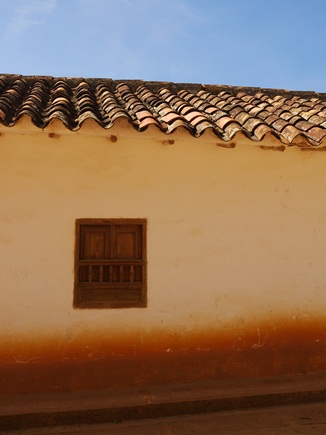
…whitewashed walls and terracotta-tiled rooftops under blue skies…
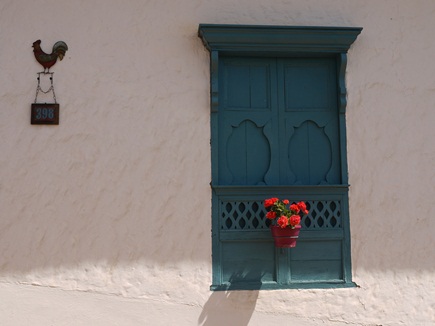
…and a tasteful colour palette of flowers and shutters. As beautiful as it was, for us it didn't quite have the magical charm of Zapatoca – somewhere that is definitely on our list of places to return sooner rather than later.
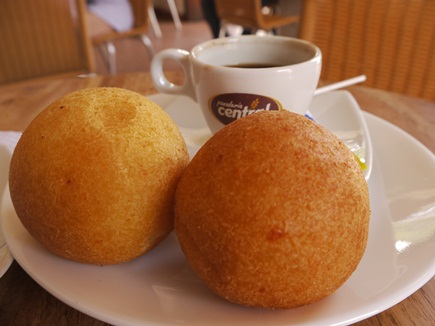
Of course, there was only one way to celebrate a ride this good: tinto and buñuelos from the local panadería. After all, we must have burnt a few calories on those climbs…
Breathtaking
October 18th, 2012
El Cocuy. A Colombian national park that we’d never heard of wasn’t exactly on our bucket list but from the moment we were shown pictures of this little known treasure, we decided that it was worth a visit.
Julian our fantastic host from Bucaramanga wanted to see the park too and so having spent a week cycling away from him, a two hour bus journey took us back to his house. Plans gradually came together for a five day walking trip and with the bikes safely stowed away, we embarked on an epic 18 hour bus journey from Bucaramanga to the village of El Cocuy, gateway to the park itself.
From here the journey got a bit tougher as the park is tucked away in the mountains and access isn’t easy….by the time we hopped off the truck ready to start hiking, our journey had taken three days and we hoped it would be worth it. Little did we know we’d be trekking back down to El Cocuy in less than 24 hours.
Sarah
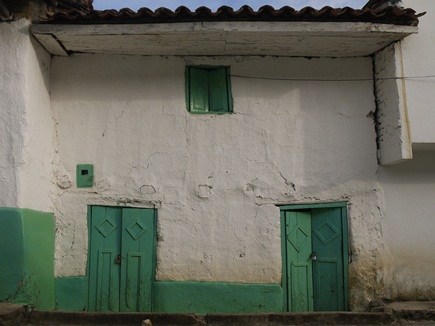
Arriving late in El Cocuy we decided to take the next day to acclimatise, have a look around town, and prepare for our journey into the park. The external walls of every building in town are painted the same colour; whitewashed walls with blocks of sea-green. In the early mountain light it gives the town a welcoming, peaceful feel.
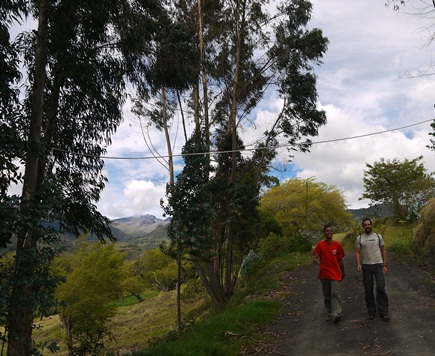
With a bit of time to spare, we hit the surrounding hills for a brief walk. It was some sort of feeble attempt at a warm up, knowing full well that the climbs and altitude in the park waiting for us were much more serious.
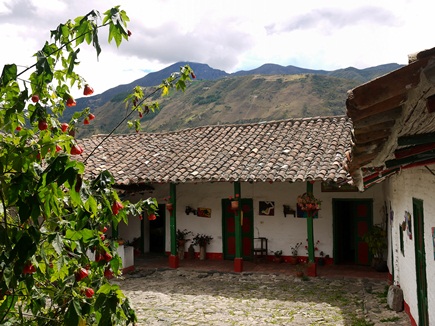
We made time to indugle in a heavy lunch (as always, any excuse to load up on calories) in the dining room of this pretty colonial house. In true Colombian style, it was high in carb content, came with fresh fruit juice, and was a bargain – we were all stuffed for about $2.50 each.
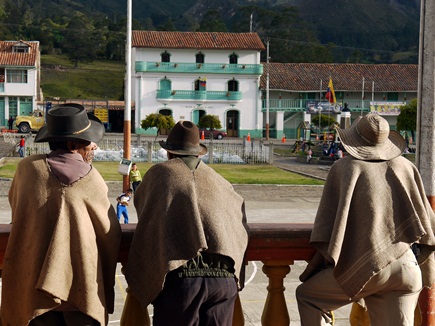
In the early evening, there was a wander around the town square, soaking up the refreshing mountain air alongside men in hats and ruanas (warm ponchos)…
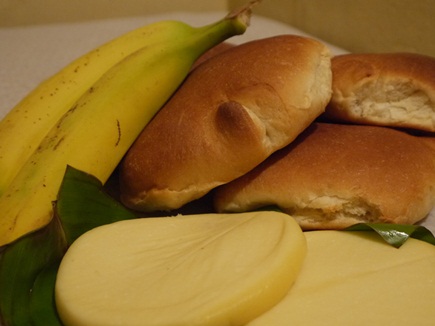
…and then back to the guesthouse for a typical mountain supper which in these parts is fresh bread, bananas, hot chocolate made with fresh milk and mountain cheese wrapped in leaves.
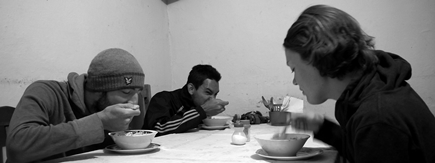
We were up before the roosters on the day of departure to the park but the lady of the house was up even earlier, making us “caldo de papas”, potato soup with poached eggs. A hearty breakfast to prepare us for some serious walking.
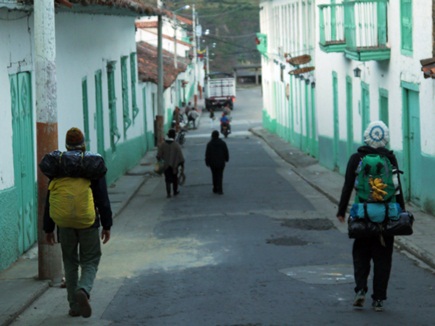
Walking through the sleepy streets, with fully laden rucksacks in place of heavily loaded bikes, we headed for the town square…
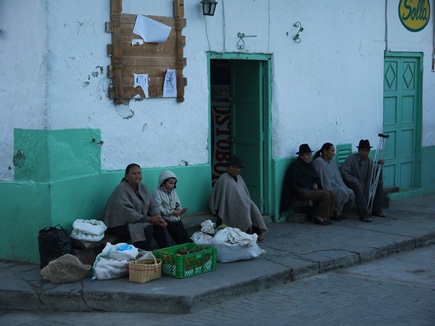
…with many others who were up at the same hour, huddled in their ruanas, wiping the sleep from their eyes too.
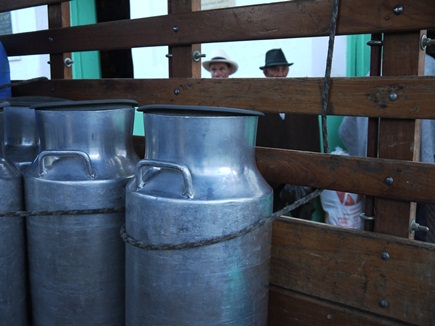
Our early start was to make sure we didn't miss “El Lechero”, Colombia's answer to the milk float. Not quite the battery powered runaround us Brits remember, this truck is one of the only heavy duty vehicles that goes as far as the park boundaries and so we get a lift with the churns….
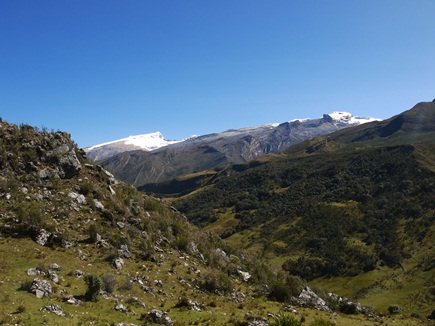
The ride on El Lechero took over an hour as we wound our way through the mountains, climbing from 2700m to 4000m. For two people from the flatlands of East Anglia, we couldn't help feeling on top of a very beautiful world. Julian had never seen snow before and so he was suitably impressed by it all too.
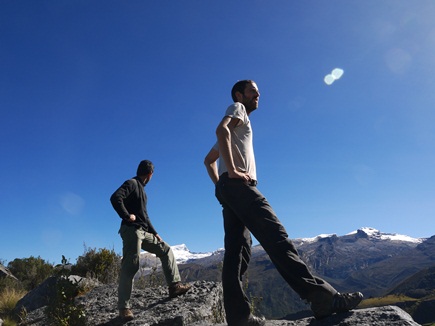
Just a few minutes in and James and Julian feel compelled to pose for the obligatory outdoor catalogue shot complete with spectacular backdrop.
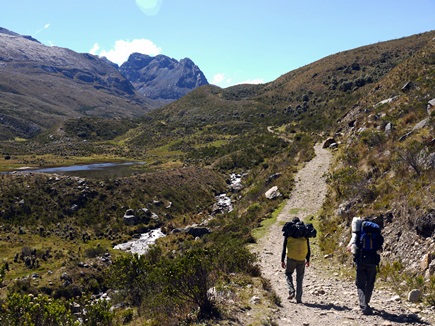
And then we were off again, breathing heavily and crisping slightly in the bright sun. We'd felt breathless walking up hill in El Cocuy at 2700m but this was a whole new level. At 4000m and with fierce sunshine added in, the few hours walking to the first camping ground was not steep or particularly technical but it was tough in other ways.
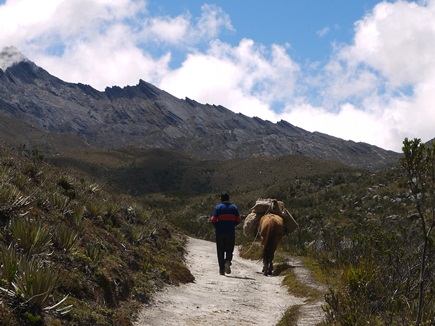
We stop a local to check we were heading the right way and he assures us we're just twenty minutes away…
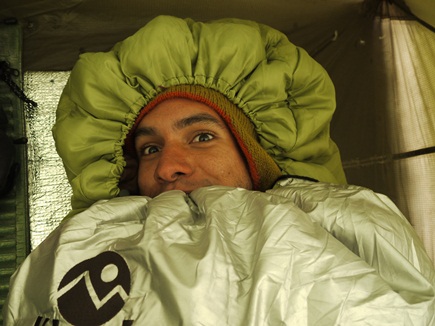
Suddenly the bright blue sky and fluffy white clouds disappear and the tent is up just in time, before the rains come. Weary from the early start and our first high altitude hike, we take the opportunity to snuggle into sleeping bags and get cosy.
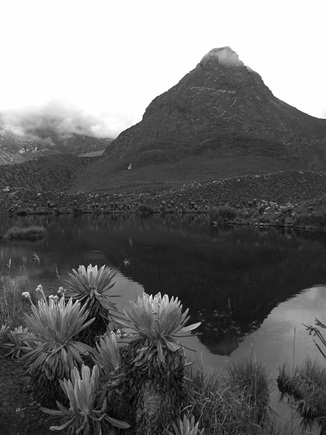
The skies are clear for long enough for us to escape the tent for an hour and explore some of the nearby lagoons. The landscape, even under cold grey skies, is stunning; like nothing we've seen before. We look forward to more climbing and hiking tomorrow.
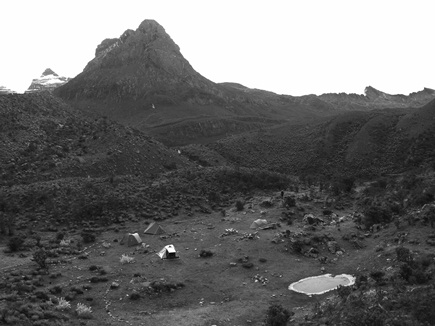
But our enthusiasm is not matched by our capacity. The quick ascent in the milk truck to 4000m proves too much for former fen-dwellers James and I and through the night we suffer from altitude sickness: nausea, headaches and fatigue. We're definitely not up to further hiking at greater altitude and the next morning we make the difficult decision to return to El Cocuy, three days earlier than planned. We pack up the tent.
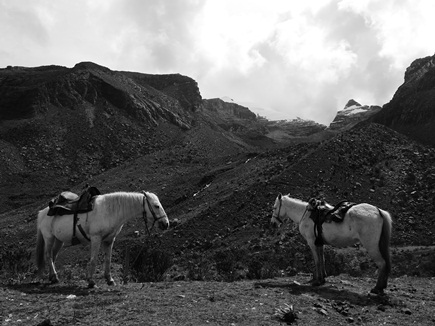
We were obviously gutted to cut our trip to such a beautiful place short but the sheer height had literally knocked the wind out of our sails and the only way to deal with it was to descend and let our bodies recover. These hardy mountain ponies don't seem to suffer from the same problem.
